Filter by
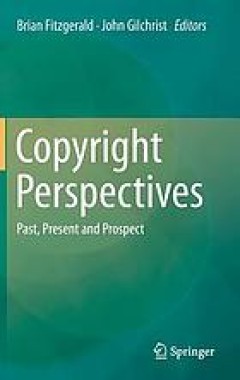
Copyright perspectives : past, present and prospect
This book provides international and domestic perspectives on the law of copyright and is led by a foreword on the future of copyright by Dr Francis Gurry, Director General of WIPO and a chapter on the lessons for copyright policy in classical Roman law, by Justice Arthur Emmett. The body of this collection covers current perspectives in the digital age, from the application of the Berne Conven…
- Edition
- -
- ISBN/ISSN
- 9783319159133
- Collation
- xiv, 317 pages
- Series Title
- -
- Call Number
- 346.0482

Copyright Versus Open Access On the Organisation and International Political …
This book addresses the recent debate about copyright law and its impact on the distribution of scientific knowledge from an economic perspective. The focus is on the question whether a copyright regime or an open access regime is better suited to the norms and organizational structure in a purely global science community. The book undertakes a thorough economic analysis of the academic journal…
- Edition
- -
- ISBN/ISSN
- 9783319127392
- Collation
- xvi, 191 pages
- Series Title
- -
- Call Number
- -
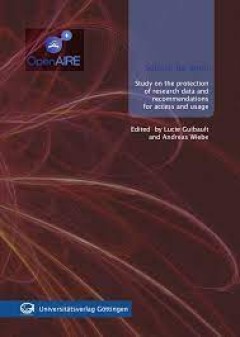
Safe to be open - study on the protection of research data and recommendation…
This study addresses the most important legal issues when implementing an open access e-infrastructure for research data. It examines the legal requirements for different kinds of usage of research data in an open access infrastructure, such as OpenAIREplus, which links them to publications. The existing legal framework regarding potentially relevant intellectual property (IP) rights is analyse…
- Edition
- -
- ISBN/ISSN
- -
- Collation
- -
- Series Title
- -
- Call Number
- -
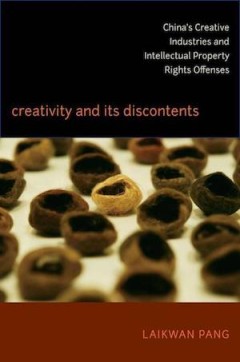
Creativity and its Discontents : China’s Creative Industries and Intellectu…
Creativity and Its Discontents is a sharp critique of the intellectual property rights (IPR)–based creative economy, particularly as it is embraced or ignored in China. Laikwan Pang argues that the creative economy—in which creativity is an individual asset to be commodified and protected as property—is an intensification of Western modernity and capitalism at odds with key aspects of Chi…
- Edition
- -
- ISBN/ISSN
- 9781478091530
- Collation
- -
- Series Title
- -
- Call Number
- 340 PAN c

Direct Licensing and the Music Industry How Technology, Innovation and Compet…
This book discusses the economics of the music industry in the context of the changing landscape brought about by innovation, technological change, and rapid digitization. The ability of digital technology to reduce the transaction costs of music copyright licensing has all but destroyed the traditional media business models of incumbent Performance Rights Organizations (PROs), music publishers…
- Edition
- -
- ISBN/ISSN
- 9783319176536
- Collation
- xxv, 293 pages
- Series Title
- -
- Call Number
- 346.0482
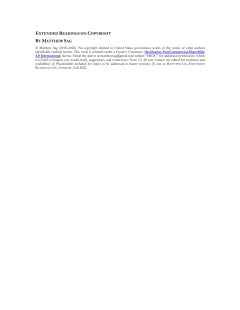
Extended Readings on Copyright
Extended Readings on Copyright is subject to a non-commercial Create Commons license that allows you to add, subtract, and amend as you see fit, provided you extend those terms to any derivative work based on these materials and provided your provide appropriate attribution. I encourage you to share your edits and additions with me, but it is not obligatory.Extended Readings on Copyright can be…
- Edition
- -
- ISBN/ISSN
- -
- Collation
- -
- Series Title
- -
- Call Number
- 340 SAG e
The Digital Public Domain : Foundations for an Open Culture
Digital technology has made culture more accessible than ever before. Texts, audio, pictures and video can easily be produced, disseminated, used and remixed using devices that are increasingly user-friendly and affordable. However, along with this technological democratization comes a paradoxical flipside: the norms regulating culture's use —copyright and related rights —have become increa…
- Edition
- -
- ISBN/ISSN
- 9781906924454
- Collation
- -
- Series Title
- -
- Call Number
- 340 DIG
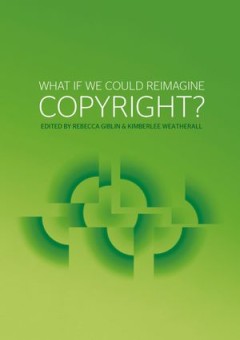
What if we could reimagine copyright?
What if we could start with a blank slate, and write ourselves a brand new copyright system? What if we could design a law, from scratch, unconstrained by existing treaty obligations, business models and questions of political feasibility? Would we opt for radical overhaul, or would we keep our current fundamentals? Which parts of the system would we jettison? Which would we keep? In short, wha…
- Edition
- -
- ISBN/ISSN
- 9781760460808
- Collation
- -
- Series Title
- -
- Call Number
- -
 Computer Science, Information & General Works
Computer Science, Information & General Works  Philosophy & Psychology
Philosophy & Psychology  Religion
Religion  Social Sciences
Social Sciences  Language
Language  Pure Science
Pure Science  Applied Sciences
Applied Sciences  Art & Recreation
Art & Recreation  Literature
Literature  History & Geography
History & Geography